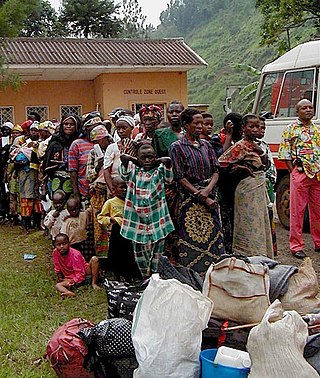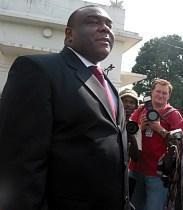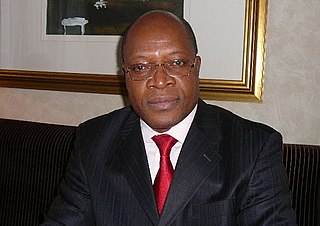Discovered in the 1990s, human remains in the Democratic Republic of the Congo have been dated to approximately 90,000 years ago. The first real states, such as the Kongo, the Lunda, the Luba and Kuba, appeared south of the equatorial forest on the savannah from the 14th century onwards.

Laurent-Désiré Kabila or simply Laurent Kabila, was a Congolese revolutionary and politician who was the third President of the Democratic Republic of the Congo from 1997 until his assassination in 2001.

The Democratic Republic of the Congo (DRC), also known as Congo-Kinshasa and formerly known as Zaire, is a country in Central Africa. By land area, the DRC is the second-largest country in Africa and the 11th-largest in the world. With a population of around 112 million, the Democratic Republic of the Congo is the most populous officially Francophone country in the world. The national capital and largest city is Kinshasa, which is also the economic center. The country is bordered by the Republic of the Congo, Central African Republic, South Sudan, Uganda, Rwanda, Burundi, Tanzania, Zambia, Angola, the Cabinda exclave of Angola and the South Atlantic Ocean.

Joseph Kabila Kabange is a Congolese politician who served as President of the Democratic Republic of the Congo between January 2001 and January 2019. He took office ten days after the assassination of his father, President Laurent-Désiré Kabila in the context of the Second Congo War. He was allowed to remain in power after the 2003 Pretoria Accord ended the war as the president of the country's new transitional government. He was elected as president in 2006 and re-elected in 2011 for a second term. Since stepping down after the 2018 election, Kabila, as a former president, serves as a senator for life.

The Second Congo War, also known as the Great War of Africa or the Great African War, began in the Democratic Republic of the Congo in August 1998, little more than a year after the First Congo War, and involved some of the same issues. Eventually involving belligerents from across the African continent, the war officially ended in July 2003 when the Transitional Government of the Democratic Republic of the Congo took power. Although a peace agreement was signed in 2002, violence has continued in many regions of the country, especially in the east. Hostilities have continued since in the ongoing Lord's Resistance Army insurgency, and the Kivu and Ituri conflicts. Nine African countries and around twenty-five armed groups became involved in the war.

Étienne Tshisekedi wa Mulumba was a Congolese politician and the leader of the Union for Democracy and Social Progress (UDPS), the main opposing political party in the Democratic Republic of the Congo (DRC). A long-time opposition leader, he served as Prime Minister of the country on three brief occasions: in 1991, 1992–1993, and 1997.

Jean-Pierre Bemba Gombo is a politician in the Democratic Republic of the Congo (DRC). He has served as the DRC's Vice Prime Minister and defence minister since 2023. He was previously one of four vice-presidents in the transitional government of the Democratic Republic of the Congo from 17 July, 2003 to December 2006. He led the Movement for the Liberation of the Congo (MLC), a rebel group turned political party. He received the second-highest number of votes in the 2006 presidential election. In January 2007, he was elected to the Senate.

General elections were held in the Democratic Republic of the Congo on July 30, 2006. They were the first multiparty elections in the country in 41 years, and the first since the overthrow of longtime leader Mobutu Sese Seko nine years earlier. Voters went to the polls to elect both a new President of the Republic and a new National Assembly, the lower-house of the Parliament.

Dr. Oscar Kashala Lukumuena is a Boston-based scientist, clinical researcher, university professor, and senior executive in the biopharmaceutical industry in the United States of America (USA). He is a politician in the Democratic Republic of the Congo and was a reformer candidate in the 2006 presidential election and 2011 presidential elections.

Moïse Katumbi Chapwe is a Congolese businessman and politician. He was Governor of Katanga Province, located in the southern part of the Democratic Republic of the Congo, from 2007 to September 2015. He was a member of the People's Party for Reconstruction and Democracy (PPRD) until September 2015. He has been described by The Economist as "probably the second most powerful man in the Democratic Republic of Congo after the president, Joseph Kabila". Jeune Afrique named him "African of the Year" in 2015.

The Republican Guard of the Democratic Republic of the Congo, formerly known as the Special Presidential Security Group, is maintained by President Félix Tshisekedi. Military of the Democratic Republic of the Congo (FARDC) military officials state that the Garde Républicaine is not the responsibility of FARDC, but the Head of State. Apart from Article 140 of the Law on the Army and Defence, no legal stipulation on the DRC's Armed Forces makes provision for the GR as a distinct unit within the national army. In February 2005, President Joseph Kabila passed a decree which appointed the GR's commanding officer and 'repealed any previous provisions contrary' to that decree. The GR is more than 10,000 strong, and formerly consisted of three brigades, the 10th, at Kinshasa, the 15th, and the 16th, at Lubumbashi. It has better working conditions and is paid regularly, but still commits numerous crimes near their bases, including against United Nations officials.
John Numbi was a Congolese security officer and retainer of Joseph Kabila, who rose to the rank of General. Until January 2010, he was the Inspector General of the Congolese National Police. In 2018 he was appointed as the Inspector General of the Armed Forces of the Democratic Republic of the Congo (FARDC). He was replaced in that role in 2020, and fled the DR Congo after Joseph Kabila's power dwindled in the first quarter of 2021.
Médard Mulangala Lwakabwanga is a politician from the Democratic Republic of the Congo. He is President of the Union for a Republican Majority and a leader of the Union Sacree pour l’Alternance, an umbrella grouping of opposition parliamentary parties and community groups that forms the third-largest political structure within the opposition and Rapporteur of the National Assembly’s Committee on Economics and Finance, making him the opposition’s lead spokesman on budgetary, economic and investment policy in the Republic.
Army General Gabriel Amisi Kumba was Chief of Staff of the Forces Terrestres, the army of the Democratic Republic of the Congo. Amisi was a former Forces armees Zairoises (FAZ) officer who was recruited into the Alliance of Democratic Forces for the Liberation of Congo (AFDL) in 1996. During the Second Congo War, Amisi was assistant chief of staff for logistics of the Rally for Congolese Democracy (RCD-G). This position was the origin of his nickname, as T-4 was the abbreviation for his position. He was implicated by Human Rights Watch in the execution of soldier Joe Lona Bifuko and in the torture of prisoners in the ANC military intelligence detention centre in Goma in 2001.

Senate elections were held in the Democratic Republic of the Congo on 14 March 2019 to elect the 108 Senators. Former DRC President Joseph Kabila, who stepped down from office in January 2019 following the inauguration of the recently elected Félix Tshisekedi, has also joined the upper house of the legislature as a senator for life, for a total of 109 seats.

General elections were held in the Democratic Republic of the Congo on 30 December 2018, to determine a successor to President Joseph Kabila, as well as for the 500 seats of the National Assembly and the 715 elected seats of the 26 provincial assemblies. Félix Tshisekedi (UDPS) won with 38.6% of the vote, defeating another opposition candidate, Martin Fayulu, and Emmanuel Ramazani Shadary, backed by the ruling party PPRD. Fayulu alleged that the vote was rigged against him in a deal made by Tshisekedi and outgoing President Kabila, challenging the result in the DRC's Constitutional Court. Different election observers, including those from the country's Roman Catholic Church, also cast doubt on the official result. Nonetheless on 20 January the Court rejected his appeal and declared Tshisekedi as the winner. Parties supporting President Kabila won the majority of seats in the National Assembly. Félix Tshisekedi was sworn in as the 5th President of the Democratic Republic of the Congo on 24 January 2019, making it the first peaceful transition of power in the country since it became independent from Belgium in 1960.

Samy Badibanga Ntita is a Congolese politician who was Prime Minister of the Democratic Republic of the Congo from November 2016 to May 2017. He was also on the ballot for the 2018 Democratic Republic of the Congo general election as a presidential candidate.

On 20 December 2016 the Democratic Republic of the Congo's president, Joseph Kabila, announced that he would not leave office despite the end of his constitutional term. Protests subsequently broke out across the country, which had never had a peaceful transfer of power since it gained independence in 1960. The protests were met with the government's blocking of social media, and violence from security forces which left dozens dead. Foreign governments condemned the attacks against protesters.

Félix Antoine Tshisekedi Tshilombo is a Congolese politician who has been the President of the Democratic Republic of the Congo since 24 January 2019. He is the leader of the Union for Democracy and Social Progress (UDPS), the DRC's oldest and largest party, succeeding his late father Étienne Tshisekedi in that role, a three-time Prime Minister of Zaire and opposition leader during the reign of Mobutu Sese Seko. Tshisekedi was the UDPS party's candidate for president in the December 2018 general election, which he was awarded, despite accusations of irregularities from several election monitoring organisations and other opposition parties. The Constitutional Court of the DRC upheld his victory after another opposition politician, Martin Fayulu, challenged the result, but Tshisekedi has been accused of making a deal with his predecessor, Joseph Kabila. The election marked the first peaceful transition of power since the state became independent from Belgium in 1960.
Sylvestre Ilunga Ilunkamba is a Congolese politician who was appointed as the Prime Minister of the Democratic Republic of the Congo in May 2019, formally establishing his government in August 2019. He has had a long political career going back to the 1970s, having held a number of ministerial cabinet posts, and was previously a professor at the University of Kinshasa since 1979. Ilunga has also been the secretary general of Congo's national railway company. He has a reputation as an experienced public servant and technocrat, as well as an ally of former President Joseph Kabila.














